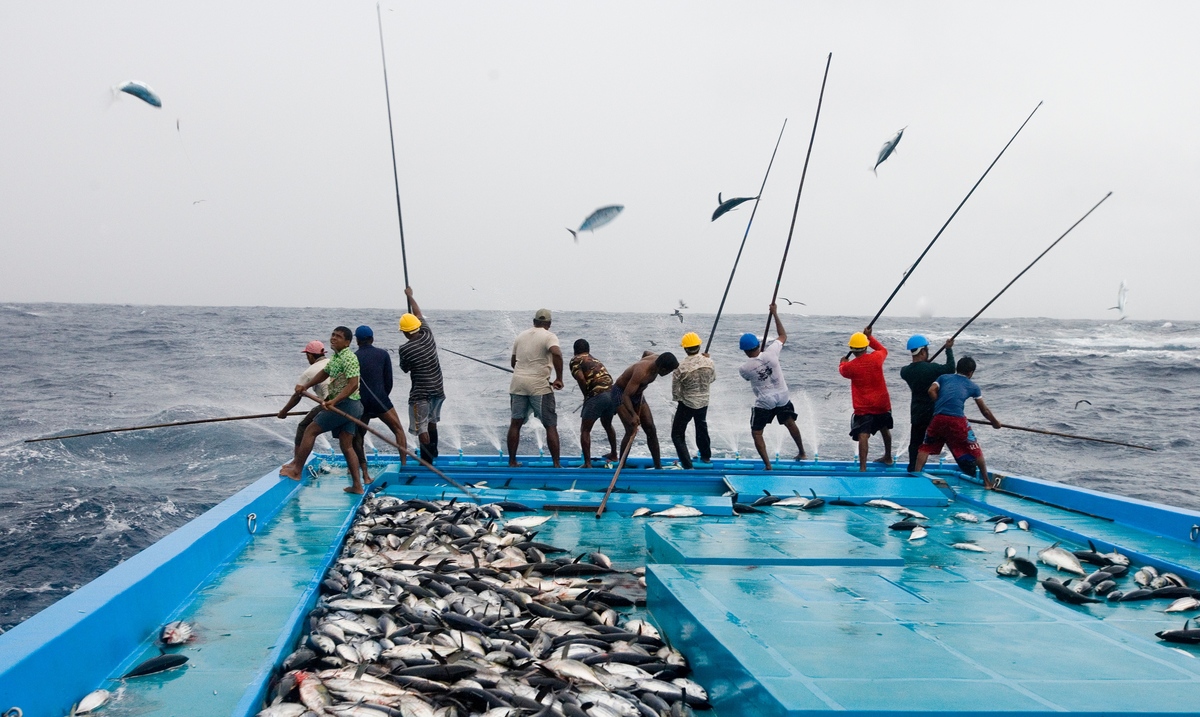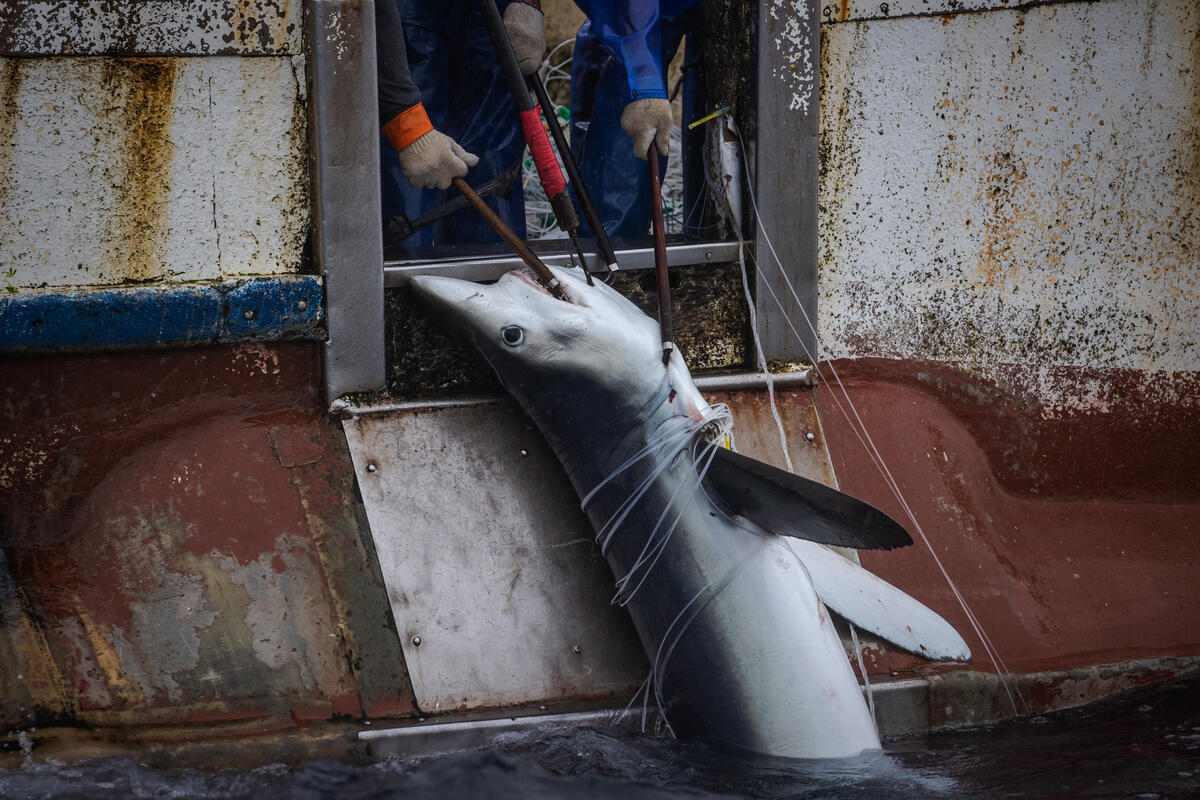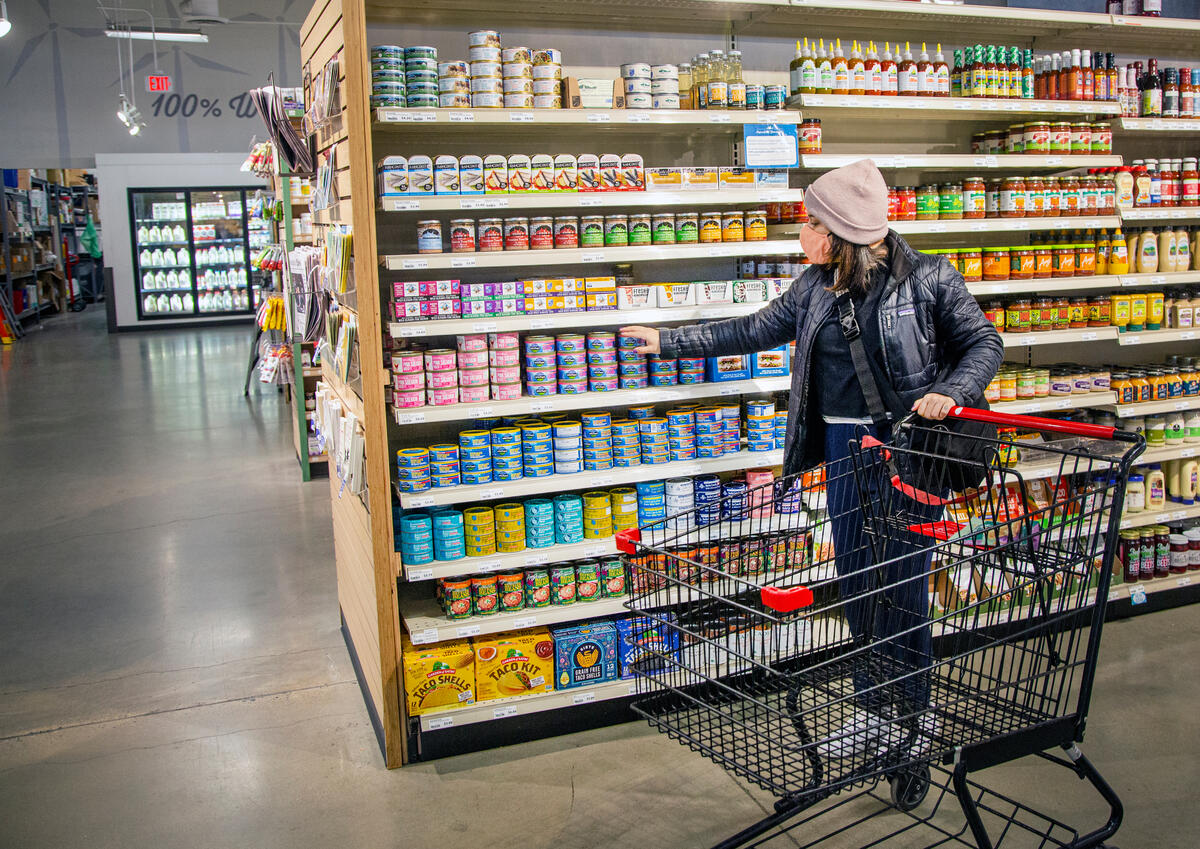
Protect workers and wildlife at sea
As consumers, our choices matter —especially for the health of our oceans. The U.S. is one of the world’s largest consumers of seafood, and the largest market for canned tuna. This means our supermarkets are one of the strongest connections to our oceans.
A destructive industry
Our oceans, once thought to be endlessly abundant, are being depleted by overfishing and destructive fishing practices. This has caused the populations of the ocean’s top predators — like sharks, tuna, and swordfish — to drop by as much as 90 percent over the past 50 years.
But the industry’s harm does not stop there — human rights are also a casualty of this destructive industry. Forced labor and human trafficking, forms of modern slavery, are “a severe problem” in the industry, according to the International Labor Organization. And reports from Greenpeace East Asia and Southeast Asia tell harrowing tales of conditions onboard, including 20 hour work days, being cut off from contact with family, docked wages, lack of potable water and nutritious food, violence, and even death. Workers have reported being beaten, abused, and forced to work on ships for months or years at a time.


At your local grocery store
Fish caught under these conditions are making their way onto U.S. supermarket shelves. This reality, however, has largely been hidden from U.S. consumers. US grocery retailers make a lion’s share of the revenue in the tuna industry. In 2018, tuna vessels worldwide netted $11 billion. Yet retailers earned almost four times that amount from their sales of tuna products in the same year. Making matters worse, for the most part the retailers that profit from tuna products have yet to hold themselves and their suppliers to more rigorous standards. Let’s be clear — this isn’t about forcing consumers to make tough choices. It’s about demanding that companies and supermarkets make meaningful and necessary changes so that the sustainable seafood option is the easiest choice for shoppers. We must also ensure that the U.S. government has and enforces regulations that prevent companies from having the option to import goods that exploit workers and our oceans.
Spotlight on tuna
The U.S. is one of the world’s largest consumers of seafood, and the largest market for canned tuna. Unfortunately, most of the tuna found on supermarket shelves — including well-known brands like Bumblebee and Starkist — come from destructive fishing methods that injure and kill other marine animals and may put workers at risk.
One of the largest tuna brands in the U.S., Bumble Bee, is owned by the world’s largest canned tuna trader — Taiwanese company FCF. As we pressure them to clean up their supply chain, other companies must follow suit.
Human & labor rights
The commercial fishing vessels that supply the industry operate in the middle of the world’s largest oceans. They are quite possibly the most isolated workplace on the planet; human rights and environmental standards have always been easy to skirt.
Read more about Greenpeace International’s Sustainability, Labor & Human Rights, and Chain of Custody Asks for Retailers, Brand Owners and Seafood Companies.
Your grocery store ranked
Our The High Cost of Cheap Tuna report spotlights which major grocery chains are leaders in sustainable and ethical seafood and which are falling behind.
Applauding industry leaders and exposing those lagging behind is key to getting supermarkets to take responsibility and play their part in protecting our oceans.
Is your supermarket selling sustainable seafood? Find out by downloading the The High Cost of Cheap Tuna 2023 report.
Learn more about…

The Global Oceans Treaty
-

New Analysis of Five Major U.S. LNG Export Projects Finds Every One Fails the “Climate Test”
The new analysis shows that U.S. LNG export projects displace renewable energy and drive up emissions – making them incompatible with a livable climate
-

The ‘Big, Beautiful’ Blunder: a bill that will live in infamy
WASHINGTON, D.C. (July 1, 2025)—In response to the passage of the “Big Beautiful Bill” in the United States Senate, Greenpeace USA Deputy Climate Program Director, John Noël, said: “This is…
-

Wrecking the future: the Trump war on the ocean, climate, and communities
Wrecking the future: The Trump war on the ocean, climate, and communities. Dismantling climate and oceans protections.
-

The high cost of cheap tuna: US supermarkets, sustainability, and human rights at sea (3rd edition)
In Greenpeace USA’s third scorecard measuring the human rights and sustainability practices of 16 major US supermarkets’ tuna supply chains, only two retailers achieved a passing score.
-

The High Cost of Cheap Tuna: US Supermarkets, Sustainability, and Human Rights at Sea
Published: 02-13-2023 Edition: 2nd Download: PDF A net bulging with tuna and bycatch on the Ecuadorean purse seiner ‘Ocean Lady’, which was spotted by Greenpeace in the vicinity of the northern Galapagos Islands while using fishing aggregating devices (FADs). Around 10% of the catch generated by purse seine FAD fisheries is unwanted bycatch and includes…
-

Fake My Catch: The Unreliable Traceability in our Tuna Cans
US seafood company Bumble Bee, one of the leading companies in the canned tuna market with nearly 90% consumer awareness levels, and its Taiwanese parent company Fong Chun Formosa Fishery Company (hereinafter referred to as FCF), one of the top three global tuna traders, play an important role in the global tuna industry, and thus…
-

2021 Tuna Retailer Scorecard: The High Cost of Cheap Tuna
When Greenpeace USA published the first edition of Carting Away the Oceans (CATO) in 2008, not a single company out of the 16 major US retailers ranked on seafood sustainability received a passing score. Most of the companies surveyed had hardly given a thought to sustainable seafood; many had weak or non-existent policies, and commonly…
-

Fact Sheet: The Illegal Fishing and Forced Labor Prevention Act
Illegal, unreported, and unregulated (IUU) fishing, a top threat to ocean ecosystems and global food security, is inextricably linked to human rights abuses at sea. Workers on fishing vessels around…
-

High Stakes: The Impacts of Destructive Fishing
The Indian Ocean is a crucial ecosystem in the race to protect the high seas. From safeguarding marine biodiversity to promoting sustainable, socially responsible fishing, the changes needed to protect…
-

Comments Concerning the Ranking of Taiwan by the U.S. Department of State in the 2021 Trafficking in Persons Report
Publication Date: April 1, 2021 Author: GLJ-ILRF and Greenpeace on behalf of the Seafood Working Group This document contains the Seafood Working Group (SWG)’s comments concerning Taiwan’s ranking in the…
-

Fisheries Observers are Human Rights Defenders on the World’s Oceans
Fisheries observers are human rights defenders on the world’s oceans. These individuals work independently onboard commercial fishing vessels around the world to collect scientific data on the state of the…
-

Choppy Waters – Forced Labor and Illegal Fishing in Taiwan’s Distant Water Fisheries
DOWNLOAD THE REPORT Taiwan is one of the world’s largest distant water fishing (DWF) powers, with over 1,100 Taiwanese-flagged vessels fishing across our oceans and hundreds more Taiwanese-owned vessels flagged…
-

Greenpeace Sustainability, Labour & Human Rights, and Chain of Custody Asks for Retailers, Brand Owners and Seafood Companies
Greenpeace seeks a substantial transformation from fisheries production dominated by large-scale, socially and economically unjust, and environmentally destructive methods to prioritise smaller scale, community-based, labour intensive fisheries using ecologically responsible,…
-

Human Rights for Migrant Fishers
Abolish the Overseas Employment Scheme for Migrant Fishers and Expedite the Domestication of ILO Convention No. 188
-

Carting Away the Oceans 10
To view the report, click here. This 10th-anniversary edition of Carting Away the Oceans identifies which major supermarkets are leaders in sustainable seafood and which are falling behind. The findings are…

